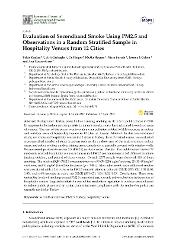| dc.contributor.author | Kaplan, Bekir | |
| dc.contributor.author | Çarkoğlu, Aslı | |
| dc.contributor.author | Ergör, Gül | |
| dc.contributor.author | Hayran, Mutlu | |
| dc.contributor.author | Sureda, Xisca | |
| dc.contributor.author | Cohen, Joanna E. | |
| dc.contributor.author | Navas-Acien, Ana | |
| dc.date.accessioned | 2019-06-27T08:01:22Z | |
| dc.date.available | 2019-06-27T08:01:22Z | |
| dc.date.issued | 2019 | |
| dc.identifier.issn | 1660-4601 | en_US |
| dc.identifier.uri | https://hdl.handle.net/20.500.12469/360 | |
| dc.identifier.uri | https://doi.org/10.3390/ijerph16081381 | |
| dc.description.abstract | Background: Turkey passed a law banning smoking in all indoor public places in 2008. In response to the indoor smoking restriction many smokers may have relocated to outdoor areas of venues. The aim of this study was to evaluate air pollution related to SHS exposure in indoor and outdoor areas of hospitality venues in 12 cities in Turkey. Method: In this cross-sectional study we evaluated hospitality venues in 12 cities in Turkey. In each visited venue we evaluated a pre-specified number of study locations such as the outdoor area of the main entrance indoor areas and patios or other outdoor dining areas completely or partially covered with window walls. We measured particulate matter 2.5 (PM2.5) in those areas. Results: The fieldworkers visited 72 randomly selected hospitality venues and measured PM2.5 concentrations in 165 different locations (indoor outdoor and patios) of those venues. Overall 2573 people were observed 909 of them smoking. The median (IQR) PM2.5 concentrations were 95 (39-229) g/m(3) indoors 25 (13-48) g/m(3) outdoors and 31 g/m(3) (16-62) in the patios (p < 0.001). After adjustment each additional smoker was associated with a 2% increase in PM2.5 concentrations in patio air (GMR (95% CI): 1.02 (1.00 1.05) and a 4% increase in indoor air (GMR (95% CI): 1.04 (1.02 1.05). Conclusions: There were unhealthy levels of smoking-caused PM2.5 concentrations not only indoors but also in the patios of hospitality venues. Legislative efforts to expand the smoke-free legislation to outdoor areas adjacent to indoor public places and an action plan to increase compliance with the smoke-free policy are urgently needed in Turkey. | en_US] |
| dc.language.iso | eng | en_US |
| dc.publisher | MDPI | en_US |
| dc.rights | info:eu-repo/semantics/openAccess | en_US |
| dc.subject | secondhand smoke | en_US |
| dc.subject | PM2.5 | en_US |
| dc.subject | Turkey | en_US |
| dc.subject | Hospitality venue | en_US |
| dc.title | Evaluation of Secondhand Smoke Using PM2.5 and Observations in a Random Stratified Sample in Hospitality Venues from 12 Cities | en_US |
| dc.type | article | en_US |
| dc.relation.journal | International Journal of Environmental Research and Public Health | en_US |
| dc.identifier.issue | 8 | |
| dc.identifier.volume | 16 | en_US |
| dc.department | Fakülteler, İktisadi, İdari ve Sosyal Bilimler Fakültesi, Psikoloji Bölümü | en_US |
| dc.identifier.wos | WOS:000467747100074 | en_US |
| dc.identifier.doi | 10.3390/ijerph16081381 | en_US |
| dc.identifier.scopus | 2-s2.0-85065023370 | en_US |
| dc.institutionauthor | Çarkoğlu, Aslı | en_US |
| dc.relation.publicationcategory | Makale - Uluslararası Hakemli Dergi - Kurum Öğretim Elemanı | en_US |
| dc.identifier.pmid | 30999605 | en_US |
















